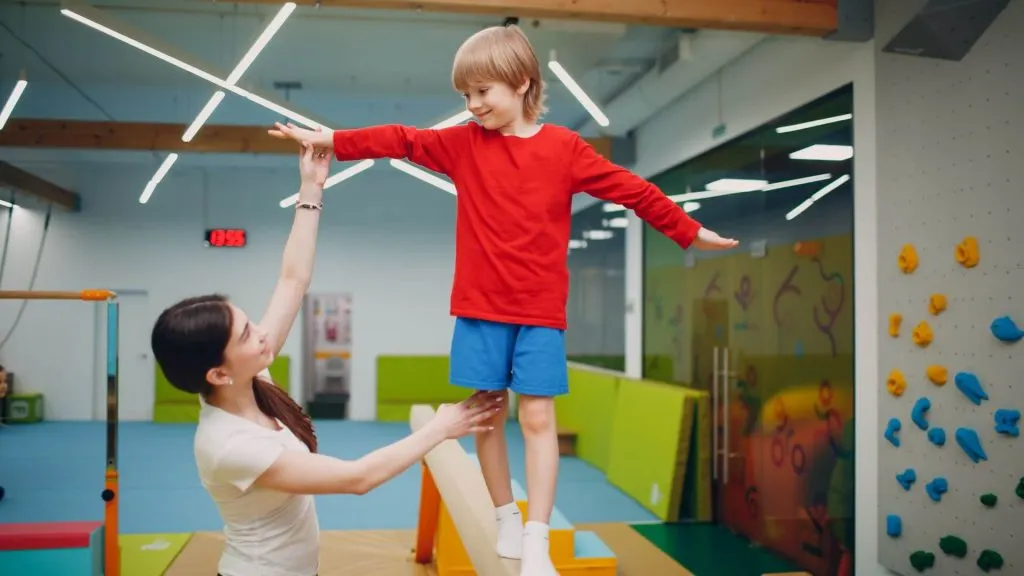Physical skills are vital to a child’s development, impacting their physical health and overall well-being. These skills form the basis for navigating the world, from basic activities like walking to more complex tasks like sports or playing an instrument. Early childhood is crucial for acquiring these abilities and fostering competence and confidence. This article explores six key physical skills that promote overall development and a healthier, more active life.

1. Balance and Coordination
These essential physical skills are the foundation of most activities and sports. Balance is maintaining a controlled body position during movement (dynamic balance) or staying still (static balance). Coordination involves executing smooth and efficient movements. Both motor skills are vital for a child’s development and can be improved through Gracie Barra Brazilian Jiu-Jitsu training. With its focus on body awareness, balance, and coordination drills, Jiu-Jitsu helps children enhance these skills while having fun.
Motor skills are categorized into two types: gross motor skills and fine motor skills. Gross motor skills involve larger muscle groups, like those used for running, jumping, and throwing. Fine motor skills involve smaller muscle groups, like those used for writing, drawing, and tying shoelaces. Martial arts’ complex movements develop gross and fine motor skills, improving physical abilities and making everyday tasks easier for children.
2. Strength and Endurance
Strength is a vital skill for children, enabling them to perform tasks effectively and participate in various activities. It involves exerting force against resistance, like lifting weights, climbing stairs, or standing up from a seated position. Playing on the playground, swimming, or martial arts can greatly enhance a child’s strength. Martial arts lessons are designed to build muscular strength, benefiting children’s overall health and well-being.
Endurance is the ability to sustain physical or mental effort for extended periods. Children with good endurance can engage in activities without getting tired quickly. This skill is crucial in sports like running, swimming, and cycling. Developing endurance can be fun for children through games involving running, skipping, or jumping. Martial arts training is also great for building endurance in kids, focusing on continuous, disciplined movement.
3. Agility and Flexibility
Agility is the ability to move quickly and easily, changing directions with control and balance. It requires a combination of speed, strength, coordination, and flexibility. Agility training can be incorporated into martial arts lessons through quick movement changes and reaction time drills.
Flexibility involves the range of motion in joints and muscles. It helps prevent injuries by allowing children’s bodies to move freely and comfortably. Stretching exercises are crucial in improving a child’s flexibility, and martial arts training includes various stretches as part of warm-up and cool-down routines.
This is something parents should think about getting for themselves as well because flexibility and mobility are just as important in adulthood. Families living around Space City like to find martial arts classes for adults in Houston to improve their strength, posture, and joint health while bonding over a shared activity. Regular stretching through martial arts classes can help alleviate stiffness from desk jobs and reduce the risk of injury during everyday tasks. Plus, it’s a fun way to stay active without needing a gym.
4. Body Control and Spatial Awareness
Body control is the ability to move and coordinate body parts effectively. It involves controlling movements precisely and accurately, a critical skill in dance, sports, or everyday tasks like tying shoelaces. Martial arts training or self defence classes helps children develop body control with a focus on precise movements and techniques.
Spatial awareness is understanding one’s position in space and how objects around us relate to our body. Try mixing family friendly recipes with martial arts movements and drills. Kids will have fun while learning to move their bodies in space, improving their spatial awareness. These skills are also beneficial in activities like playing musical instruments or dancing.
5. Focus and Concentration
Focus is directing attention to a specific task and ignoring distractions. For children, this can be concentrating on hitting a baseball, following dance steps, or observing opponents in martial arts. Martial arts emphasize focus; students must listen to instructors’ demonstrations and instructions, replicating complex movements and sequences.
Concentration, akin to focus, involves sustaining attention for extended periods. This skill is vital in endurance sports, where maintaining a steady pace or rhythm is paramount. In martial arts, concentration is crucial during form practice or sparring, as a momentary lapse can result in missing an opponent’s move.
6. Confidence and Self-Esteem
As children become more skilled in physical activities, their confidence and self-esteem naturally grow. This boost in self-belief can positively affect other areas of their lives, like academics and social interactions. Martial arts training offers a safe and supportive environment for children to build confidence by overcoming challenges, setting goals, and achieving personal growth.
As children progress in martial arts, they develop physical skills and more, building a foundation for a healthy lifestyle. They learn self-defense, discipline, and valuable life skills with dedicated instructors and a supportive community. Your child will thrive both on and off the mats.
Martial arts training offers a unique and holistic approach to enhancing children’s physical abilities. It improves motor skills and instills important life skills like discipline, focus, and confidence. Through martial arts, children can have fun while developing essential physical and mental skills to benefit them in all areas of their lives. So, give your child the gift of martial arts and watch them grow into a strong, confident, and well-rounded individual.

Jessi is the creative mind behind The Coffee Mom, a popular blog that combines parenting advice, travel tips, and a love for all things Disney. As a trusted Disney influencer and passionate storyteller, Jessi’s authentic insights and relatable content resonate with readers worldwide.
